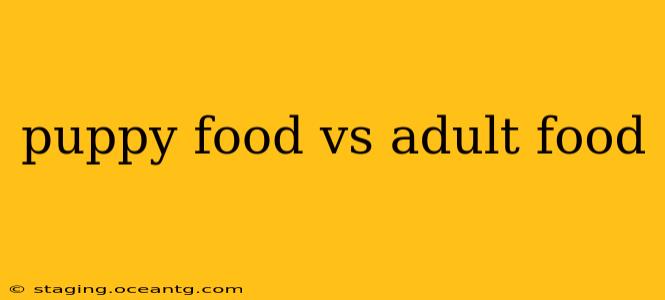Choosing the right food for your canine companion is crucial for their health and well-being. But with so many options available, understanding the key differences between puppy food and adult dog food is essential. This comprehensive guide will delve into the nutritional needs of puppies versus adult dogs, highlighting why specialized puppy food is so important during those crucial early growth stages.
What are the key nutritional differences between puppy and adult dog food?
The most significant difference lies in the nutrient density and composition. Puppies are growing rapidly, requiring significantly more calories and specific nutrients to support their development. Puppy food is formulated with higher levels of protein, fat, calcium, and phosphorus—all vital for bone development, muscle growth, and overall health. Adult dog food, on the other hand, is designed for maintenance, featuring lower calorie counts and a balanced nutrient profile suitable for mature dogs.
Why is puppy food so important for growing puppies?
Puppies have unique nutritional needs that adult dog food simply can't meet. Their rapid growth phase necessitates a diet rich in:
- High-Quality Protein: Essential for building and repairing tissues, supporting muscle development, and strengthening the immune system.
- Fat: Provides energy for their active lifestyles and contributes to healthy skin and coat.
- Calcium and Phosphorus: Crucial for strong bones and teeth development. An imbalance can lead to skeletal problems.
- Vitamins and Minerals: Support healthy growth, immune function, and overall well-being. Specific vitamins like Vitamin A and Vitamin D are especially important during this stage.
What happens if I feed my puppy adult dog food?
Feeding a puppy adult dog food can lead to several problems:
- Slowed Growth: Insufficient calories and nutrients can hinder proper growth and development, resulting in smaller adult size or skeletal deformities.
- Nutritional Deficiencies: Lack of crucial vitamins and minerals can compromise immune function, lead to weakened bones, and affect overall health.
- Increased Risk of Illness: A malnourished puppy is more susceptible to illness and infections.
- Digestive Issues: Adult dog food may be harder for a puppy's digestive system to process, potentially causing diarrhea or vomiting.
Can I switch my puppy to adult food early?
No, it's generally not recommended to switch your puppy to adult dog food prematurely. The transition should only happen once your puppy has reached full maturity, typically between 12 and 18 months old, depending on breed size. Switching too early can negatively impact their growth and long-term health. Consult your veterinarian for personalized advice on when to transition your dog.
How do I choose the right puppy food?
Choosing the right puppy food involves careful consideration:
- Breed Size: Different breeds grow at different rates, requiring specific formulations to meet their needs. Larger breeds require different nutritional profiles compared to smaller breeds.
- Life Stage: Ensure the food is specifically formulated for puppies, clearly labelled as such.
- Ingredients: Look for high-quality protein sources as the primary ingredient, followed by healthy fats and carbohydrates. Avoid artificial colors, flavors, and preservatives.
- Your Vet's Recommendation: Always consult your veterinarian for personalized recommendations based on your puppy's breed, age, size, and overall health.
What if my adult dog eats puppy food?
While not ideal for long-term feeding, an occasional snack of puppy food won't cause significant harm to a healthy adult dog. However, consistent consumption of puppy food can lead to weight gain due to its higher calorie content. Stick to their adult food for optimal health.
This information should not be considered a substitute for professional veterinary advice. Always consult your veterinarian to determine the best food for your individual dog’s needs. Remember, providing proper nutrition is a cornerstone of your canine companion’s health and happiness throughout their life.
